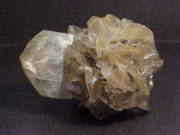Difference between revisions of "Selenite"
Jump to navigation
Jump to search
(username removed) |
|||
| (3 intermediate revisions by 2 users not shown) | |||
| Line 2: | Line 2: | ||
== Description == | == Description == | ||
| − | A clear colorless crystal of hydrated calcium sulfate ([ | + | A clear colorless crystal of hydrated calcium sulfate ([[gypsum|gypsum]]). Selenite crystals, thought by the Greeks to be moonstones, are silky and are formed by the evaporation of sea water. Selenite can trap sand within its crystal forming an hourglass shape. |
== Synonyms and Related Terms == | == Synonyms and Related Terms == | ||
| − | satin spar; | + | satin spar; desert rose; Marienglas (Deut.); seleniet (Ned.) |
| − | == | + | ==Resources and Citations== |
* G.S.Brady, ''Materials Handbook'', McGraw-Hill Book Co., New York, 1971 Comment: p. 386 | * G.S.Brady, ''Materials Handbook'', McGraw-Hill Book Co., New York, 1971 Comment: p. 386 | ||
| Line 18: | Line 18: | ||
* Jack Odgen, ''Jewellery of the Ancient World'', Rizzoli International Publications Inc., New York City, 1982 | * Jack Odgen, ''Jewellery of the Ancient World'', Rizzoli International Publications Inc., New York City, 1982 | ||
| − | * Wikipedia | + | * Wikipedia: http://en.wikipedia.org/wiki/Selenite (Accessed Sept. 17, 2005) |
* ''Van Nostrand's Scientific Encyclopedia'', Douglas M. Considine (ed.), Van Nostrand Reinhold, New York, 1976 | * ''Van Nostrand's Scientific Encyclopedia'', Douglas M. Considine (ed.), Van Nostrand Reinhold, New York, 1976 | ||
Latest revision as of 12:38, 30 May 2022
Description
A clear colorless crystal of hydrated calcium sulfate (Gypsum). Selenite crystals, thought by the Greeks to be moonstones, are silky and are formed by the evaporation of sea water. Selenite can trap sand within its crystal forming an hourglass shape.
Synonyms and Related Terms
satin spar; desert rose; Marienglas (Deut.); seleniet (Ned.)
Resources and Citations
- G.S.Brady, Materials Handbook, McGraw-Hill Book Co., New York, 1971 Comment: p. 386
- Susan E. Schur, Conservation Terminology: A review of Past & Current Nomenclature of Materials, Technology and Conservation, Spring (p.34-39); Summer (p.35-38); Fall (p.25-36), 1985
- Sue Fuller, Rocks and Minerals, DK Publishing, Inc., New York City, 1995
- Jack Odgen, Jewellery of the Ancient World, Rizzoli International Publications Inc., New York City, 1982
- Wikipedia: http://en.wikipedia.org/wiki/Selenite (Accessed Sept. 17, 2005)
- Van Nostrand's Scientific Encyclopedia, Douglas M. Considine (ed.), Van Nostrand Reinhold, New York, 1976
- Random House, Webster's Encyclopedic Unabridged Dictionary of the English Language, Grammercy Book, New York, 1997
- The American Heritage Dictionary or Encarta, via Microsoft Bookshelf 98, Microsoft Corp., 1998
